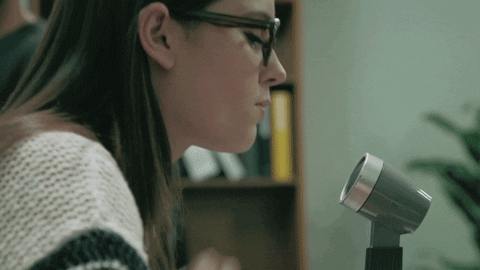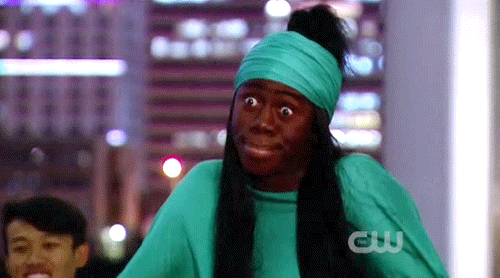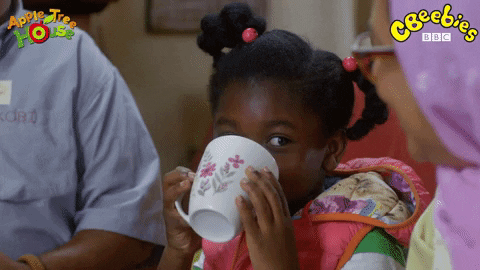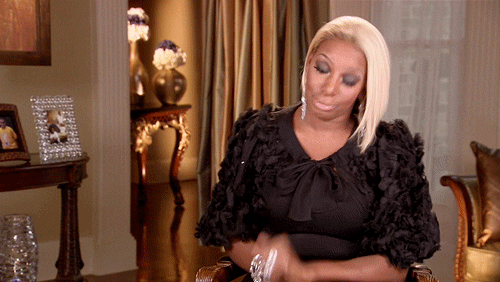Alissa Ashley just called out the fast-fashion retailer, Oh Polly, for seemingly segregating its plus-size and non-white models in the name of inclusion. We pulled the receipts but also did a deeper dive into fast-fashion retailers in general. Based on our findings, many of the internet's most beloved online boutiques have pulled and still pull similar tricks. From Forever 21 to Fashion Nova to Boohoo, the blanket social media strategy seems to be to keep plus-size and dark-skinned people far away from main feeds.
Scroll down and sip the tea for yourself. Warning: It's scalding hot.
Let's start from the beginning: Alissa Ashley called the Oh Polly retailer out on Twitter for having a separate Instagram account for what looks like plus-size and darker-skinned people.
"What in the segregation is this. What makes these women not suitable for your main page @ohpolly? Ohpollyinclusive?? Who approved this?" she asked on Twitter.
The YouTuber shared a screenshot of both Oh Polly social media accounts. The main page for the fast-fashion retailer featured only straight-sized white and/or fair-skinned models. The "inclusion" page for Oh Polly included more people of color (specifically, darker models) and those with plus-size bodies.
Not OK.
Alissa Ashley highlighted the fact that a separate Instagram page defeats the purpose of a brand labeling itself "inclusive."
"Like, imagine calling yourselves inclusive [and] not wanting to post women that don’t fit your 'aesthetic' on your brand page lmao," the YouTuber quipped. SMH. It truly is a laughable faux pas.
The rest of Twitter was just as dismayed by the blatant exclusion.
"The fact that they put in their inclusive bio '0% tolerance. 100% inclusive.' But had to make a whole separate page to include certain people," one person wrote on Twitter. The critic added a GIF that says, "Make it make sense."
People are totally put off.
"Hi @ohpolly This isn't a way of being 'inclusive.' It's called segregation," the person wrote. "Creating a whole new page to place black women is disgusting, especially when the aesthetic of your main page is white women with dark tans. #poormarketing #ohpolly"
Another critic wanted to know how long it will really take for brands to truly get the concept of inclusion.
"How and why did they think this is OK? By now, I would think brands know better but I guess I’m just too naive lol," the person wrote.
After all, way too many brands have been repeatedly called out for their discriminatory practices although few of them have exhibited any changes or even appeared to be properly held accountable.
For anyone confused about why a separate page dedicated to inclusion is not OK, let's have a breakdown.

The short answer: IT'S JUST PLAIN STUPID but I realize the world needs an explanation with more couth than that so…
The longer answer? Putting plus-size models and people with dark skin on an entirely different page from your main social media page while omitting these people from your main page to perpetuate a visual narrative that only celebrates thinness and whiteness is not inclusion. It's the direct opposite since those people are literally excluded from the main social media page.
In fact, it actually reveals that a brand is so dedicated to not being inclusive that it would rather prepare a tiny space for the people it knows it does not want to include so that it doesn't get in trouble for not including them.
That's not only dumb; it's blatantly rude as heck. If you really want to be a retailer that promotes diversity, why not have everyone with different body shapes and skin tones on one page? Pretty Little Thing does it. I checked.
Since Alissa Ashley and the rest of Twitter blew up Oh Polly's spot, the brand wants the public to know that it's very sorry.

The brand submitted its apology to Buzzfeed.
“Oh Polly made a serious error of judgement [sic] for which we take full responsibility and sincerely apologise [sic]," the brand told the publication. "We established a new page with the specific aim of allowing our customers to discuss a wider range of issues… We have a close relationship with our customers around the world and always value their feedback. Improving diversity remains an absolute priority for us across all of our channels. We promise to continue listening to everyone in the Oh Polly community and, most importantly, learn from this mistake.”
The brand has since deleted its secondary Instagram page.
Although Oh Polly is so sorry about its exclusion "mistake," the brand has yet to post any plus-size women since its fake apology several days ago.
Four days and 29 Instagram posts after the Buzzfeed article went up, the brand hasn't posted a single plus-size person on its page. It also posts about the same number of models of color as it did previously. If that doesn't confirm that this fast-fashion retailer has no interest in truly promoting and including all people, then I don't know what will. How is a brand sorry for excluding plus-size models and people of color by tucking them away in a back-up Instagram page when it has had days to switch up its Instagram posting habits and has not?
Make it make sense, y'all.
The Revelist team would also be failing you if we didn't acknowledge that Oh Polly isn't the only fast fashion brand that discriminates against people in this way.

The internet can be a murky and confusing place that causes issues to be sectioned off when they really are all connected. Oh Polly may be the latest fast-fashion retailer to be called out for its terrible representation efforts but it's not the only one. Not even close.
Fashion Nova also has a separate Fashion Nova Curve Instagram page which wouldn't be an issue if it weren't for how exclusionary its main page is.
There are 70 photos on the main Fashion Nova Instagram page before you reach an actual plus-size woman. She's wearing a gorgeous bikini. Why don't we see her more? Why are there 70 photos of smaller models before we reach one image of a person with a plus-size body? Also, it's important to note that some of the women shown are indeed wearing Fashion Nova Curve, but not all women who wear Fashion Nova Curve are actually plus-size by definition. Many of the women Fashion Nova promotes on its main page for wearing Fashion Nova Curve are women who have seemingly enhanced bodies so that their waist is drastically smaller than the actual butt size. They're cute and all but we need more representation than that.
By plus-size model, I do not mean models with big boobs, a snatched waist, and a massive butt. That's just what our society fetishizes today so that's what Fashion Nova seems to primarily promote. Actual plus-size women like the woman featured here and other people who do not have the ideal "hourglass" body deserve to be represented also. Where are they?
Oh yeah, there's also the fact that I actually had to go in and count 69 photos before I got to a model who could be considered dark-skinned on the Fashion Nova Instagram page.
That count is accurate at the time of publication. Fashion Nova has been called out repeatedly for how it minimally features dark-skinned models. Jackie Aina called out the brand for this practice as well as its size exclusion. For a few days after her YouTube video blew up, the brand posted more models with darker skin but now I see it's back to the scheduled program. To reiterate, that's disgusting. Fashion Nova is actually practicing colorism and size-exclusion just like Oh Polly.
Forever 21 has also been accused of discriminating against its plus-size shoppers via social media.
The retailer was dragged by shoppers who follow its Forever 21 Plus Instagram page for promoting the Selena Quintanilla-Pérez clothing brand when the brand didn't even bother to include many plus-size designs in the collection. Of the 94 items in the collection on the Forever 21 website at the time, only six plus-size pieces are offered and some of them were available online only. SMH.
Why promote a collection to plus-size people on your Forever 21 Plus page if they can't even really shop the entire collection?
There's also some other shocking-but-not-really news about the Forever 21 Plus Page.

Forever 21 has only posted ONE dark-skinned person on its plus-size Instagram page ALL THIS YEAR. Yes, I counted all the way up until 2018. She is an influencer named Charmaine Charmant. Forever 21 seems to like her A LOT since it posted her multiple times. There was one photo of another person with dark skin but it turns out, that's Charmant too. She had just changed her hair in that photo.
As a dark-skinned woman myself, I would be surprised if I weren't so used to it.
Fast-fashion retailer Boohoo also seems to have a fascination with all things white and skinny, per its equally shoddy Instagram posts.
The brand seems to have an even worse record of omitting plus-size people from its Instagram than Fashion Nova or Oh Polly. I scrolled until my fingers and wrists ached and didn't find one plus-size person. The brand posts often so I stopped once I hit March. That's still a mighty long time to *forget* about diversity. Sheesh. I didn't see many people who could even be remotely considered dark-skinned either.
Ta-da! Many of the internet's favorite fast-fashion retailers couldn't care less about including plus-size people or dark-skinned people.

Spend those dollars and use those discount codes… wisely?




